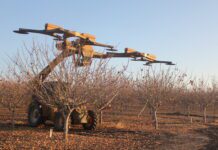Drought conditions during bloom may relieve growers from managing PFA (pistillate flower abortion) in the current season.
PFA is the loss of nut-producing pistillate (female) flowers during bloom due to an excessive pollen load on them.
“The environment during bloom is the most important determinant of whether PFA will affect the crop,” according to Elizabeth Fichtner, UCCE far advisor in Tulare and Kings Counties. When PFA occurs, flowers stop growing at two to three millimeters and fall about 10 days after bloom, reducing nut set and ultimately lowering yields. PFA is a common problem among growers of ‘Serr’ and ‘Tulare’ varieties, with Serr being the most affected, Fichtner said.
There are multiple strategies for managing PFA, including chemical and cultural control. An effective chemical strategy recommended by UC researchers for preventing PFA is application of the ethylene biosynthesis inhibitor ReTain, a plant growth regulator containing the active ingredient AVG. AVG inhibits the production of ethylene, which is triggered by excess pollen and is the root cause of PFA.
According to the product’s website, ReTain should be applied as soon as 5% to 30% of female flowers bloom or when flowers reach peak receptivity. A second application should be made at 40% to 60% bloom. Calibrated sprayers should travel 1.5 to 2 mph and spray volume should be 100 to 200 gal/A depending on tree size and PFA incidence history. Additionally, ReTain should not be used in any tank mixes.
Fichtner noted that the economic cost-return balance (cost of treatment versus expected increase in yield) must be weighed carefully in every situation. Additionally, previous UC research states that ReTain is not a general enhancer of fruit set and may not work in some orchards in some years.
Cultural strategies for preventing or mitigating PFA are also options for some walnut growers. In Serr blocks, Fichtner said that pollen can be reduced by removing pollenizer trees or mechanically shaking the catkins from pollenizer trees. If the male and female bloom in a Serr block are expected to overlap significantly, some growers may opt to also shake catkins from the Serr trees, she said. Rain events during bloom remove pollen from the air and may significantly mitigate PFA, she said, so growers generally do not have to manage PFA in seasons like the current 2021 bloom.

















